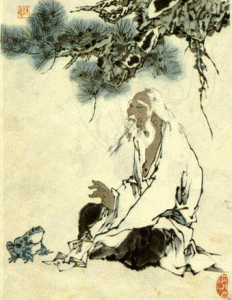One of the other great things about the Tao Te Ching is that it’s a deep mine for quotes.
Do not tinkle like jade
Or clatter like stone chimes.

Zhuangzi
This is the sort of serendipity one finds in Lao Tze. chigau asked how my kidney stone was doing and I thought, “I’ll just search up something from Tao Te Ching that offers a wise encouragement on the value of patience…” So I asked Google (I do not memorize books any more) for “tao te ching stone” and that was what came back at the top of the list.
(For non-American readers: “tinkle” is sometimes used by parents to talk to kids about urination because, I dunno, “did you pee?” is crude or something.)
I was doing more of the clattering like stone chimes than tinkling like jade.

That sounds painful, hope it’s all gone now.
I don’t suppose you saved it?
Clattering like stone chimes sounds…painful.
chigau@#2:
No, Hermann (I named him after Goering because, I dunno…) snuck out under cover of night and escaped into the septic system.
caine@#3:
Tinkling like jade doesn’t sound really hot, either. I mean when it’s all polished and smooth it’s lovely, but basically it’s quartz crystal with copper color (if I recall correctly) — little clusters of spears. Sounds about right.
I do feel that the Taoist approach of action with inaction/reaction does say something to certain medical crises. Sometimes it’s good to let things evolve at their own pace – as long as that pace doesn’t include necrosis and toxic shock. You know, that sort of thing.
Congratulations!! Now remember to stay hydrated, mm’kay?
Raucous Indignation@#6:
Now remember to stay hydrated, mm’kay?
I’ve had a few “unforgettable lessons” in my life. I think I’ll be able to track on the hydration, yep, yep.
Wikipedia sez that jade is either jadite (NaAlSi₂O₆ or Na(Al,Fe³⁺)Si₂O₆) or nephrite (Ca₂(Mg,Fe)₅Si₈O₂₂(OH)₂). No copper that I can see.
Quartz is SiO₂. While nephrite and jadeite also contain silicon and oxygen, I am pretty sure that does not make them quartz.
/nerd who looks stuff up
I have to admit, reading about kidney stones makes me want to drink and drink (water/tea).
2! 4! 6! 8! Everybody hydrate!
Owlmirror@#8:
No copper that I can see.
That demonstrates the importance of being a nerd who checks, instead of relying on my ageing memory. I thought one gemstone was basically just quartz and some impurities… I apparently have forgotten which. And I assumed jade was tinged with copper because I grew up around copper sulfate sprayed-stuff and that distinctive green is exactly the same. I don’t know if “assumed” is even the right word – it just appeared to be part of my reality because my association with the color was so strong.
Thanks for the correction.
And … stay hydrated.
Yes.
Stay hydrated.
and
Reduce your sodium intake.
chigau, ahem. Salt is essential for hydration. Too much or too little is bad.
Not meaning to be too nitpicky, but, copper sufate is blue (as hydrate or in solution).
wereatheist@#12:
Not meaning to be too nitpicky, but, copper sufate is blue
In some forms it is. When it’s spattered on red southern French vineyard terroir and red sandstone it’s green.
This could be one of those blue/green dress things.
That word is related to kidney, so I checked. Quoth Wikipedia:
Do not tinkle like jade, indeed.
cvoinescu@#14:
That was an amazing performance! Did you already know some of that and mine out the details, or was that an exercise in applied curiousity? Either way, thank you for that.
So are we to conclude that Lao Tze really was playing 4-dimensional chess using Obama’s liberal time machine? What a showoff.
Come to think of it “nephridia” are the little thingies in kidneys that exist to register pain from kidney stones. I remember nephridia from some ~1980 anatomy book.
Reading Owlmirror’s post, it intrigued me that a word for a variety of jade would use the nephr- root. I knew that was used for all things kidney (nephron, nephritis, nephrotoxic, epinephrine, nephrology, nephrotomy, …). I thought that was a funny coincidence already, so I searched, and——— jade means what— because what?!… … Thanks, Obama!
Marcus Ranum@#13:
It’s called bouillie Bordelaise, ‘broth of Bordeaux’, German: ‘Bordelaiser Brühe’. A traditional (since the late 1880s) preventional fungicide used even in organic viniculture, although accumulating copper (and it does accumulate) doesn’t sound exactly environmentally friendly to me :)
I guess part of the copper ends up as oxide, which is green.
@wereatheist #17: Sorry, but no. Copper(I) oxide is red, and copper(II) oxide is black. The green stuff everyone thinks about is basic copper carbonate, which is made of copper(II) ions, carbonate ions and hydroxide ions in two different proportions, one green, one blue. When they occur as minerals, they’re called malachite and azurite, respectively. The nice green patina to copper objects exposed to air for a long time contains both.
I stand corrected. I was of the persuasion that oxygen always wins in the end vs. not-too-noble metals. Thus I thought that patina was oxide.
But copper sulfate still is blue. I’ve seen it on a daily basis for years.